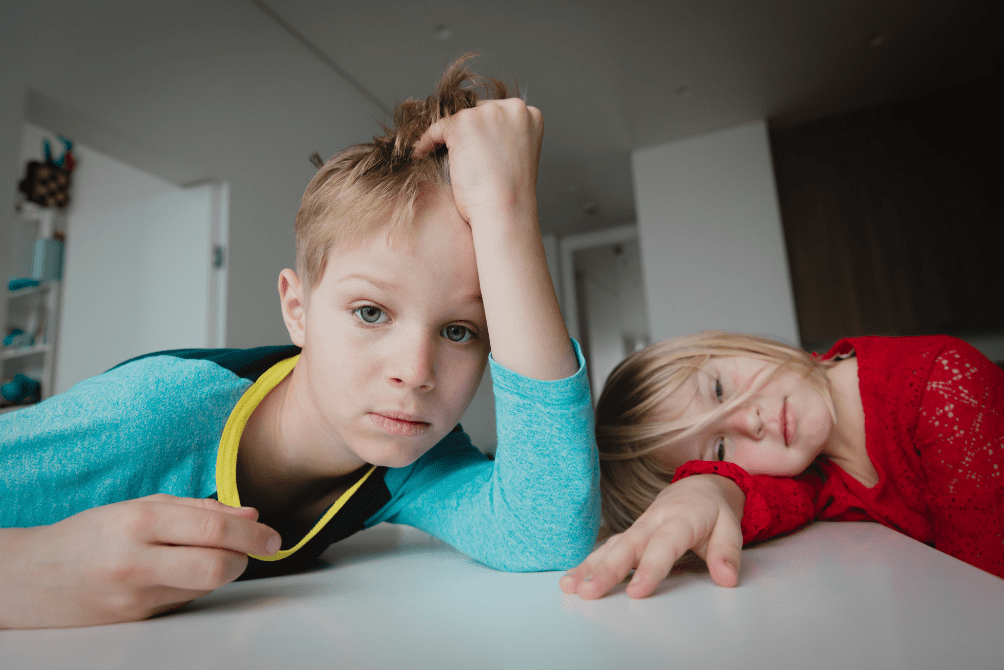Children, teens, and families across the nation have been struggling with feelings of overwhelm, stress, and uncertainty over the course of this pandemic which has caused their mental health to suffer. Rates of depression and anxiety are even higher for children and teens during this pandemic than ever.
Pandemic Worsens Child Mental Health Crisis
With mental health issues amongst children and teens already a crisis before the pandemic, it is no surprise that the pandemic is worsening the mental health of kids and their families.
According to a 2021 survey report by Common Sense titled, “Coping with COVID-19” depression and anxiety have increased amongst young people in the last two years, especially for LGBTQ+ youth. Their current survey finds that almost one in four teens and young adults report symptoms of moderate to severe depression, which has increased from 25% since 2018.
And for members of the youth with a family member who had a COVID-19 infection, they have an increased rate of depression, as half (51%) report symptoms of moderate to severe depression.
What is The Impact of COVID-19 on the Mental Health of Children and Adolescents?
COVID-19 and the resulting pandemic has disrupted the lives of children and their families across the globe. How they learn, attend and listen, play, socialize, communicate, and regulate their behaviors and emotions has been impacted. Social isolation, inconsistent education, distance learning, lack of movement, technology drain, and stress has taken its toll on kids and their parents. According to the APA Stress in America™ survey 70% of parents report pandemic-related stress, which isn’t surprising but a reflection of the reality we are all living in today.
How has the Pandemic Impacted Education?
Globally, almost 70% of students' education has been disrupted due to the coronavirus presence in 143 countries and the resulting quarantine which thrust students into distance learning.
The sudden change in both learning environment and delivery methods coupled with limited direct instruction and social interactions has hit kids hard. Children are used to the routine and structure of in-person learning and direct teaching from trained educators. Kids and parents have largely been left to navigate through what essentially is the Wild West educationally. Just the constant digital exposure and sitting has negatively affected the developing brains of our youth with focus and motivation waning as we are deep into another year of virtual or hybrid learning.
And our special education students have been especially hit hard, as they need differentiated instruction to meet their unique learning needs.
What should schools and organizations be doing to help children maintain their mental health?
Schools should be proactively planning for the mental health needs of their students and staff, as they have been highly impacted and their struggles will impact how students are learning. We should plan for students to have increased rates of focus issues, behavioral problems, and difficulty regulating their emotions because of the heightened levels of stress and mental health issues and thereby implement programs to support them as part of the regular curriculum. Every student should have a 15 to 20 minute meditation session that focuses on breathwork calming down the autonomic nervous system, which regulates our stress response. As children return to the classroom we need to explicitly teach children ways that they can regulate their brain and bodies, as well as ways to cope with stress.
An Increase in Mental Health Problems During the Pandemic
There is no doubt that the pandemic takes a toll on children’s mental health. A lack of in-person classes and a hasty transition to remote learning has significantly disrupted the lives of students and their families, increasing both stress and mental health conditions. In the fifth largest school district in the US, Clark County in Nevada, which includes Las Vegas, the extended quarantine period impacted the mental health of their students so severely that they had a surge in suicides, suicidal thoughts, and cases of self harm in students. After more than 3,000 alerts during quarantine, the district decided to return their students to in-person learning.
Increased difficulties with attention, motivation, and learning, are prevalent right now due to difficulties with virtual learning, a lack of movement and exercise, and heightened stress. Kids and adults alike are really struggling with staying focused while learning and working from home. Sitting for hours upon end whilst staring at a screen isn’t conducive to learning or physical and mental health. The brain and body need movement to get oxygen to the brain and release those all important neurotransmitters necessary for attention and motivation.
While all kids have been affected by the pandemic in one way or another, not all kids will have a long-term impact. The question is, why are some children’s and adolescent’s mental health more impacted by the pandemic than others?

Have Some Children’s Mental Health Been More Impacted by the Pandemic?
This pandemic has affected individuals quite differently, with some being more affected than others. Pre-existing mental health issues, neurodevelopmental disorders, prior-traumatic experiences, and lack of coping skills, coupled with life stressors, poor educational instruction or assistance, and even a lack of good internet access are all factors that are adversely affecting the mental health of children across the globe. We know that when it comes to managing stress, what you bring to the table helps you get through and recover from stress or even traumatic events. So for those youth that maybe already had anxiety, depression, or attention issues, their clinical issues may have been exacerbated with pandemic-related stressors.
It is important to note that some children and teens with no prior history of mental health issues are also suffering with heightened stress, anxiety, OCD, depression, suicidal thoughts, and behavioral and emotional reactivity, due to the loss of structure, routine, normal education and learning, and structured activities.
New Findings About Children’s Mental Health During COVID-19
Professionals and parents alike are wondering what the long-term impact of COVID-19 on children's mental health will be, but it will take time to fully understand how the stress of this sustained quarantine with all of it’s tangles will impact kids and their families years from now. Research from Asia (who has a history of a previous pandemic) and other countries where the COVID-19 pandemic started earlier is showing us that kids’ mental health is being highly impacted.
A summary of findings from 2021 survey report by Common Sense titled, “Coping with COVID-19 include:
- Depression has increased in the past two years
- 38% of all 14 to 22-year-olds report symptoms of moderate to severe depression
- 51% of young people with a family member with COVID report symptoms of moderate to severe depression
A Summary from the 2020 APA Stress in America™ Survey include:
- For parents of children under 18:
- 31% report their mental health has worsened compared with before the pandemic
- 47% of mothers who have children home for remote learning report their mental health has worsened
- 30% of fathers who have children home for remote learning report their mental health has worsened
- More likely to have received treatment from a mental health professional (32% vs. 12% of non-parents)
- More likely to have been diagnosed with a mental health disorder since the coronavirus pandemic began (24% vs. 9%).
- 55% of fathers reported gaining weight
- 48% of fathers said they are drinking more alcohol to cope with stress
Mental Health During COVID-19: Signs Your Child May Be Struggling
What are the effects of the COVID-19 pandemic on mental health? They vary from child to child and family to family and there are a lot of factors that impact mental health. You want to look for a change in behavior, learning, communication, or social functioning. No one is immune from stress and pandemic stress can affect anyone. With children and teens, they are more likely to show us their distress behaviorally and it often appears as a somatic complaint. To learn more about if it is just stress or anxiety, download my FREE checklist, Is It Stress or Anxiety? to help you figure out what your child needs.

download my FREE checklist, Is It Stress or Anxiety?
Factors that Impact Children’s Mental Health
There are both risk factors that put kids and teens at greater risk for mental health issues and there are “protective factors” that are correlated with good mental health. It is important to know what those risk and protective factors are, so parents can learn what to do to mitigate them. As part of my mission as the head of The Global Institute of Children’s Mental Health, I want parents to realize that there is a lot they can do to support the mental health of their children and family even during this very overwhelming time.
Risk Factors for Mental Health Issues in Children
- Social and emotional development
- Lack of attachment or nurturing
- Poverty
- Mental health of parent
- Parenting
- Family Dysfunction
- Family or marital conflict
- Trauma
- Genetics
- Exposure to neurotoxins
- Complications during pregnancy or birth
- Head injury
- Illnesses and chronic medical conditions
- Peer and academic difficulties
- Involvement in the juvenile justice system
Protective Factors in Children’s Mental Health
- Nurturing and attachment
- Positive physical development
- Positive attitudes, values or beliefs
- Conflict resolution skills
- Good mental, physical, spiritual, and emotional health
- Emotional self-regulation.
- Good coping skills and problem solving skills
- Success at school
- Good self-esteem
- Emotional self-regulation
- Strong social connections
- Strong social supports
- Strong and supportive family relationships
- Good and consistent parenting
- Reliable support and discipline from caregivers
- Family provides structure, limits, rules, monitoring, and predictability
- Clear expectations for behavior and values
- Mentors and support for development of skills and interests
- Engagement within school and community
- Positive expectations
- Emotional support for parents
- Emotional stability of parents
- Clear expectations for behavior
- Physical and psychological safety
- Knowledge of parenting and of child and youth development
Visit Youth.gov for more information about risk and protective factors for children’s mental health.
Factors that Impact Children’s Mental Health During The Pandemic
While this may be the first time the United States has faced a pandemic in modern times, Asia faced a pandemic in 2019 with long periods of isolation impacting the mental health of its citizens. In addition to the risk factors for mental health issues in children and adolescents above, the following are risk factors mental health issues in children and adolescents during the pandemic:
- Household income (Liang & Zeng, 2021)
- Parental mental or physical health (Liang & Zeng, 2021)
- Parent emotional support (Liang & Zeng, 2021)
- Having a parent with a mood or substance abuse issue (Liang & Zeng, 2021)
- Being affected by violence, abuse, poverty, and maltreatment (Liang & Zeng, 2021)
- Reduction of outdoor activities (Xie, Xue, Zhou, et al., 2020)
- Reduction of social interaction (Xie, Xue, Zhou, et al., 2020)
- Greater number of days being restricted at home (Xie, Xue, Zhou, et al., 2020)
- Not being optimistic about the epidemic (Xie, Xue, Zhou, et al., 2020)
Liang S, Zeng Q. Factors Affecting Children's Mental Health During the Coronavirus Disease 2019 Pandemic. JAMA Pediatr. 2021;175(3):319–320. doi:10.1001/jamapediatrics.2020.4933
Xie X, Xue Q, Zhou Y, et al. Mental Health Status Among Children in Home Confinement During the Coronavirus Disease 2019 Outbreak in Hubei Province, China. JAMA Pediatr. 2020;174(9):898–900. doi:10.1001/jamapediatrics.2020.1619

How Can I Help My Child or Adolescent Manage Stress?
Good coping skills and problem solving skills are the key to building the resilience that protects your child today and in the future. Building a Resiliency Mindset™ is key to helping your child or adolescent cope with stress. To learn more about stress and how to help your child build coping skills, read my blog, How does stress affect your child.
What Should I do If I Think My Child Has Anxiety, Depression, or Focus Issues?
Getting help from a licensed mental health professional is critical. Even though help may be hard to find as, according to a new WHO survey, the COVID-19 pandemic has disrupted or halted mental health services in 93% of countries worldwide, teletherapy has made mental health support more accessible. And as I discuss in my book, Teletherapy Toolkit™, teletherapy can be as effective as in-person therapy, so don’t hesitate to make a teletherapy appointment.
How parents are managing their own stress and mental health has a major influence on how your children are coping. Ultimately, children learn how to cope with stressors by watching how their parents stress and problem solve, so we parents need to take care of ourselves so we can be good role models in stress management.
Parenting a child with focus, learning, or behavioral problems was already hard, but holy cow, this pandemic has thrown fuel on the fire! Feeling overwhelmed and not sure what to do next? Then join us for the FREE Get Unstuck Parenting Summit to find out how to help your child. You can learn more about this parenting summit in my blog or you can just sign up for the FREE Get Unstuck Parenting Summit.
Always remember… “Calm Brain, Happy Family™”
Are you looking for SOLUTIONS for your struggling child or teen?
Dr. Roseann and her team are all about solutions, so you are in the right place!
There are 3 ways to work with Dr. Roseann:
You can get her books for parents and professionals, including: It’s Gonna Be OK™: Proven Ways to Improve Your Child’s Mental Health, Teletherapy Toolkit™ and Brain Under Attack: A Resource For Parents and Caregivers of Children With PANS, PANDAS, and Autoimmune Encephalopathy.
If you are a business or organization that needs proactive guidance to support employee mental health or an organization looking for a brand representative, check out Dr. Roseann’s media page and professional speaking page to see how we can work together.
Dr. Roseann is a Children’s Mental Health Expert and Therapist who has been featured in/on hundreds of media outlets including, CBS, NBC, FOX News, PIX11 NYC, The New York Times, The Washington Post,, Business Insider, USA Today, CNET, Marth Stewart, and PARENTS. FORBES called her, “A thought leader in children’s mental health.”

She is the founder and director of The Global Institute of Children’s Mental Health and Dr. Roseann Capanna-Hodge. Dr. Roseann is a Board Certified Neurofeedback (BCN) Practitioner, a Board Member of the Northeast Region Biofeedback Society (NRBS), Certified Integrative Medicine Mental Health Provider (CMHIMP) and an Amen Clinic Certified Brain Health Coach. She is also a member of The International Lyme Disease and Associated Disease Society (ILADS), The American Psychological Association (APA), Anxiety and Depression Association of America (ADAA) National Association of School Psychologists (NASP), International OCD Foundation (IOCDF) International Society for Neurofeedback and Research (ISNR) and The Association of Applied Psychophysiology and Biofeedback (AAPB).
© Roseann-Capanna-Hodge, LLC 2023
Disclaimer: This article is not intended to give health advice and it is recommended to consult with a physician before beginning any new wellness regime. *The effectiveness of diagnosis and treatment vary by patient and condition. Dr. Roseann Capanna-Hodge, LLC does not guarantee certain results.













